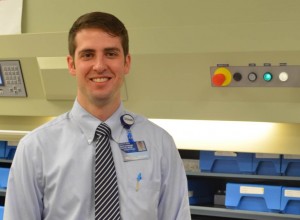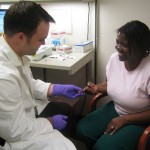Pharmacists Seeking Specialty Certification Turn to Prep Courses for Support

BCPS review and recertification courses utilize real-life patient case studies, therapeutic guidelines.
PHARMACISTS ARE BUSY PEOPLE. Between their expanding clinical and administrative responsibilities and the ever-increasing number medications they must track, practitioners who wish to obtain or maintain specialty board certification have precious little time to sort through stacks of journals trying to guess what specific knowledge they will need to meet the requirements.
Enter ASHP’s review and recertification courses and core therapeutic modules, which are helping practitioners stay abreast of current guidelines, zero in on areas where they need improvement, and prepare for Board of Pharmacy Specialties (BPS) exams.
Last June, Jennifer Clemente, Pharm.D., BCPS, ambulatory care clinical pharmacy specialist at John D. Dingell VA Medical Center in Detroit, attended the ASHP/APhA Ambulatory Care Specialty Review Course and Recertification Program in the days leading up to the 2013 ASHP Summer Meeting.
“I don’t have as much time to study as I did seven years ago, when I became board certified in pharmacotherapy. Given that I am a practitioner with a busy schedule and home life, I wanted something that would narrow my focus and make sure I identified any weaknesses,” Clemente said. “ASHP’s course is a good way to pack a lot of information into two days. It did a great job in pointing out the kinds of things that will be on the exam.”
“Employers and patients want to know that pharmacists involved in patient care have the knowledge, skills, and abilities for their specific roles.” — David Witmer, Pharm.D.
ASHP’s review and recertification courses include case study presentations in which participants follow “patients” in real-life scenarios that include initial presentation, medical history, risk factors, and complications. Clemente said these case studies gave her knowledge that she can apply directly to patient care. “It’s not just about trying to remember what will be on the exam. The courses are active learning, with examples that we all see in practice.”
A Focus on Practicality
The courses are designed specifically with utility in mind, said Sandra Oh Clarke, R.Ph., ASHP’s senior director of certification development.
“We cannot possibly teach you everything you need to know before you take the exam, but we can help you identify areas where you may need improvement, provide resources for further study, and give you a process for making decisions in caring for patients,” Clarke said.
“The exams are evidence-based and all about standards and guidelines. With the courses, you see how those guidelines apply to making recommendations and revising those recommendations if necessary as a patient’s case changes.”
When Samm Anderegg, Pharm.D., M.S., BCPS, pharmacy manager for oncology services at Georgia Regents Medical Center in Augusta, Ga., was looking for options to help himself prepare for the examination in pharmacotherapy, he was drawn to the interactive nature of the ASHP course and the credibility of the instructors.
“The modules are taught by expert practitioners who go through the cases one by one, and take you through the material,” he said. “It’s engaging, as opposed to just reading through and memorizing like we did in pharmacy school.”
Anderegg appreciates the thoroughness of the instructional material that is offered in the courses.
“If a course is just paper-based, you have to be self-motivated and driven to get through it on your own, but ASHP’s course has direction and guidance.”
Affording Flexibility
In the last 11 years, the number of pharmacists who have become board certified in a pharmacy specialty has risen from 3,600 to more than 19,000, at press time. As both newly minted and long-established pharmacists seek to distinguish themselves in a competitive job market via board certification, ASHP’s courses offer flexibility and a broad base of knowledge that will not only help them maintain their credentials, but enable them to move into new positions.
“I’ve been doing administrative jobs and not really practicing as a clinician, so the review helps me stay current,” said CDR Marc T. Young, Pharm.D., M.S., BCPS, director of project management at the United States Navy Medicine Information Systems Support Activity in San Antonio. CDR Young is currently preparing for recertification in pharmacotherapy and working his way through ASHP’s online Pharmacotherapy Recertification Package.
CDR Young, who is retiring from the Navy in June and is contemplating his next career move, is leaning toward informatics. “The review course got my mind focused like a clinician,” he noted. “In informatics, if you give a pharmacist a tool, you still have to remember how they will use it in treating a patient.”
CDR Young said he appreciates the way the literature package is fine-tuned to reflect current practice and research. “Having not practiced [in direct patient care] for a while, there are things I would not be cognizant of, but reading the articles gives me perspective. You get multiple opinions and coverage of multiple topics.”
ASHP offers Core Therapeutic Modules for pharmacists like Anderegg and CDR Young who wish to dive a little deeper into specialty exam preparation. Each of the 16 modules covers a particular clinical area, such as diabetes, gastrointestinal disorders, neurologic disorders, or management of shock, and pharmacists may choose one, several, or all of them.
The modules were developed after ASHP designed the review and recertification courses to address the need for niche coverage, according to Clarke.
“We realize that the courses move through material very quickly, but some pharmacists may want more study in certain areas once they’ve identified where their knowledge gaps are.”
Responding to Member Needs
Offering review and recertification courses and core therapeutic modules is part and parcel of helping ASHP members to advance their careers and the profession as a whole, especially as pharmacists become recognized as care providers, said David Witmer, Pharm.D., senior vice president and chief operating officer.
“Helping pharmacists prepare for board certification is about making sure the pharmacy workforce is ready to take advantage of the opportunities that will come with provider status,” Witmer said, noting the importance of board certification among young pharmacists in particular.
“The job market for young pharmacists will be more competitive, and they are seeking certification to make themselves stand out. We need to serve our membership in that capacity.”
Yet there is still a need to assist established pharmacists as the profession evolves, Witmer added. “Pharmacists will be providing care in a differentiated manner, like their medical counterparts. [Employers and patients] want to know that pharmacists involved in patient care have the knowledge, skills, and abilities for their specific roles.”
ASHP currently offers review and recertification courses in ambulatory care in partnership with APhA, pharmacotherapy, and oncology in partnership with the American College of Clinical Pharmacy. Early in 2013, BPS announced two new pharmacy specialties—pediatrics and critical care—for which it will offer board certification beginning in 2015. ASHP is currently developing review course materials for those new specialties, and the first course will be offered prior to the ASHP 2015 Summer Meetings.
–By Terri D’Arrigo










 If you want to contribute tutorials, news or other stuff please contact us. We pay 150 for each approved article.
If you want to contribute tutorials, news or other stuff please contact us. We pay 150 for each approved article. Consectetur adipisicing elit. Sed do eiusmod tempor incididunt ut labore.
Consectetur adipisicing elit. Sed do eiusmod tempor incididunt ut labore. This site uses valid HTML and CSS. All content Copyright © 2010 Newscast, Inc
This site uses valid HTML and CSS. All content Copyright © 2010 Newscast, Inc If you like what we do, please don't hestitate and subscribe to our
If you like what we do, please don't hestitate and subscribe to our